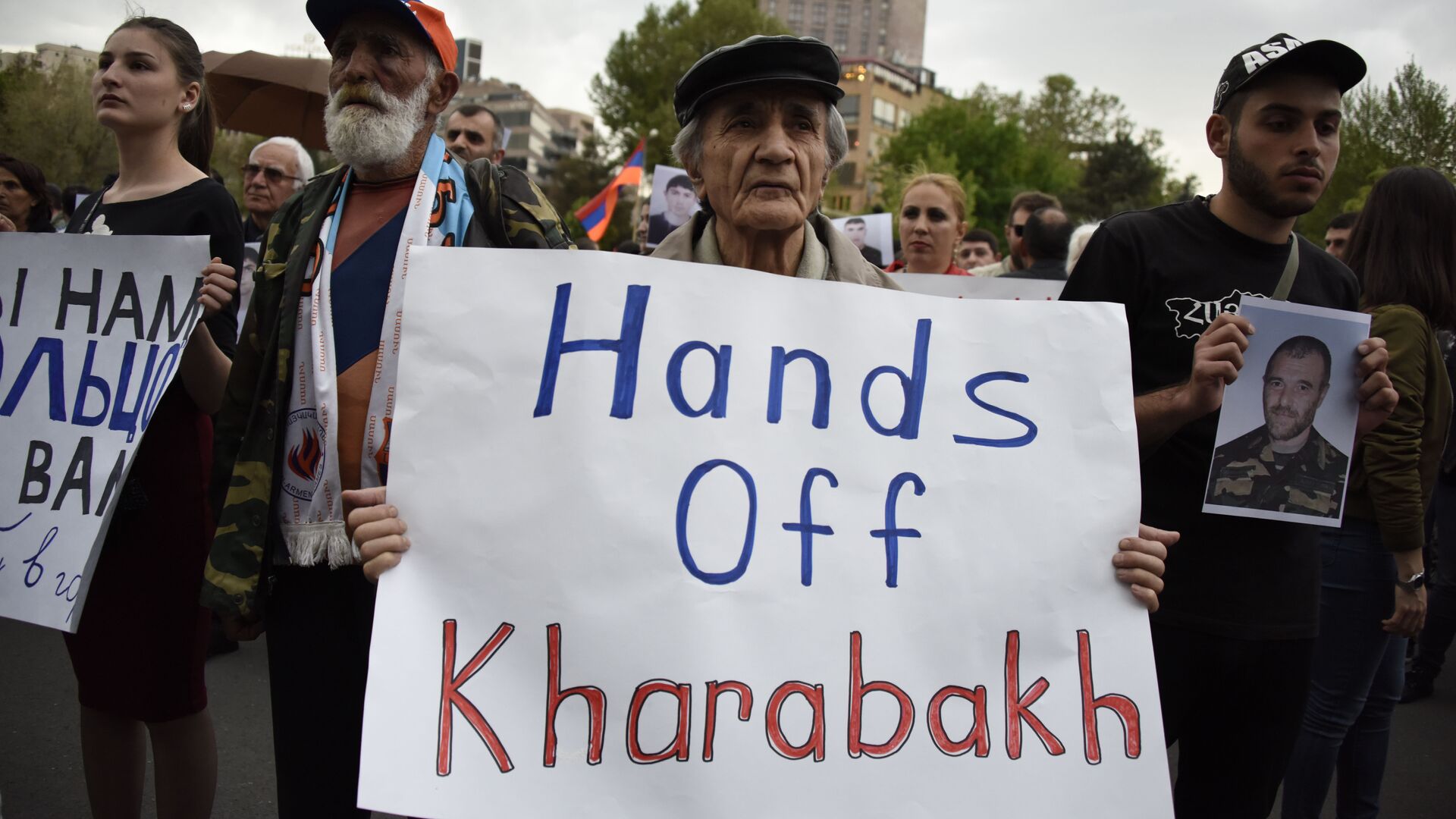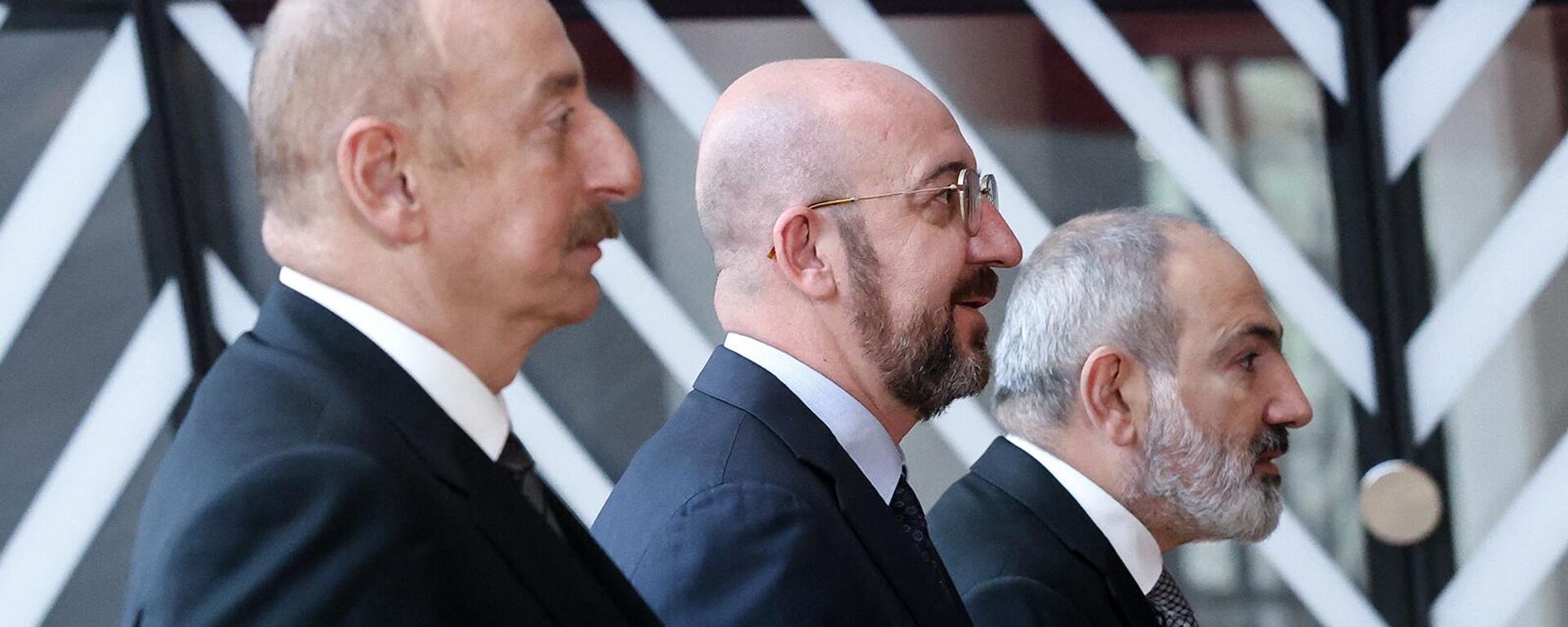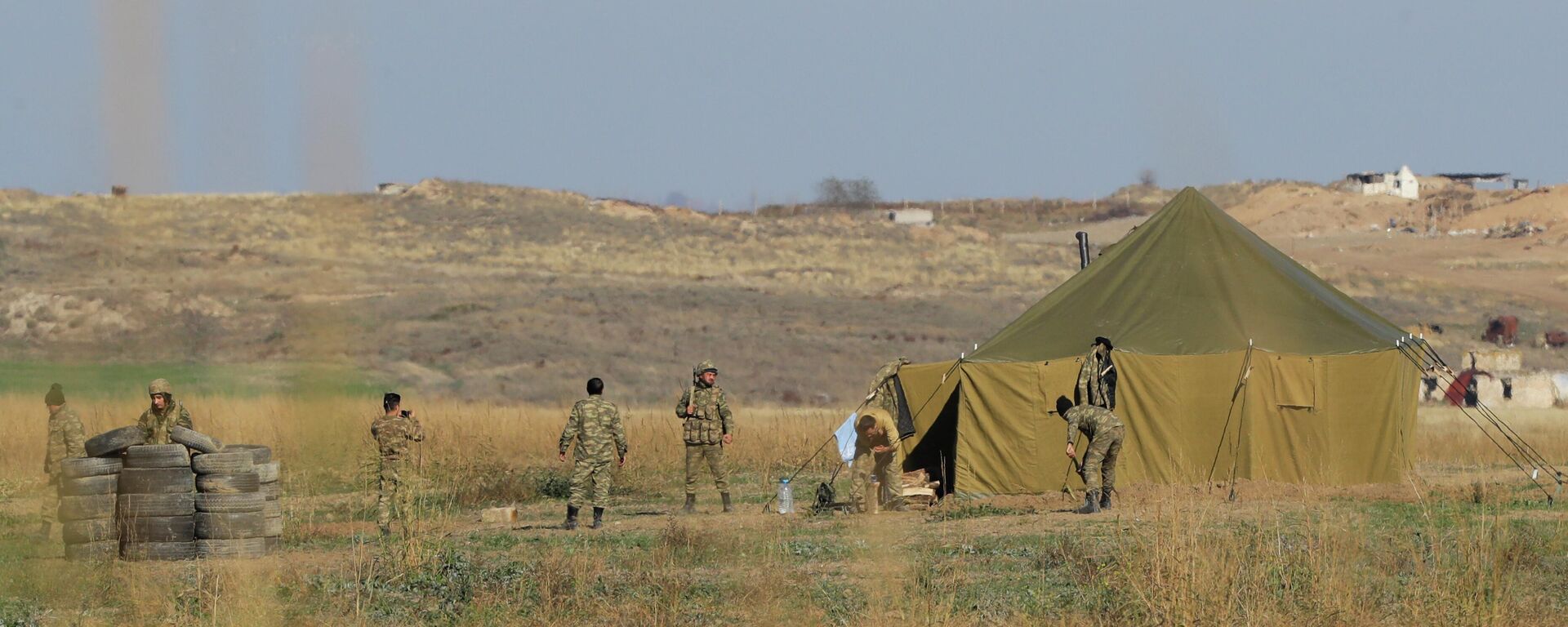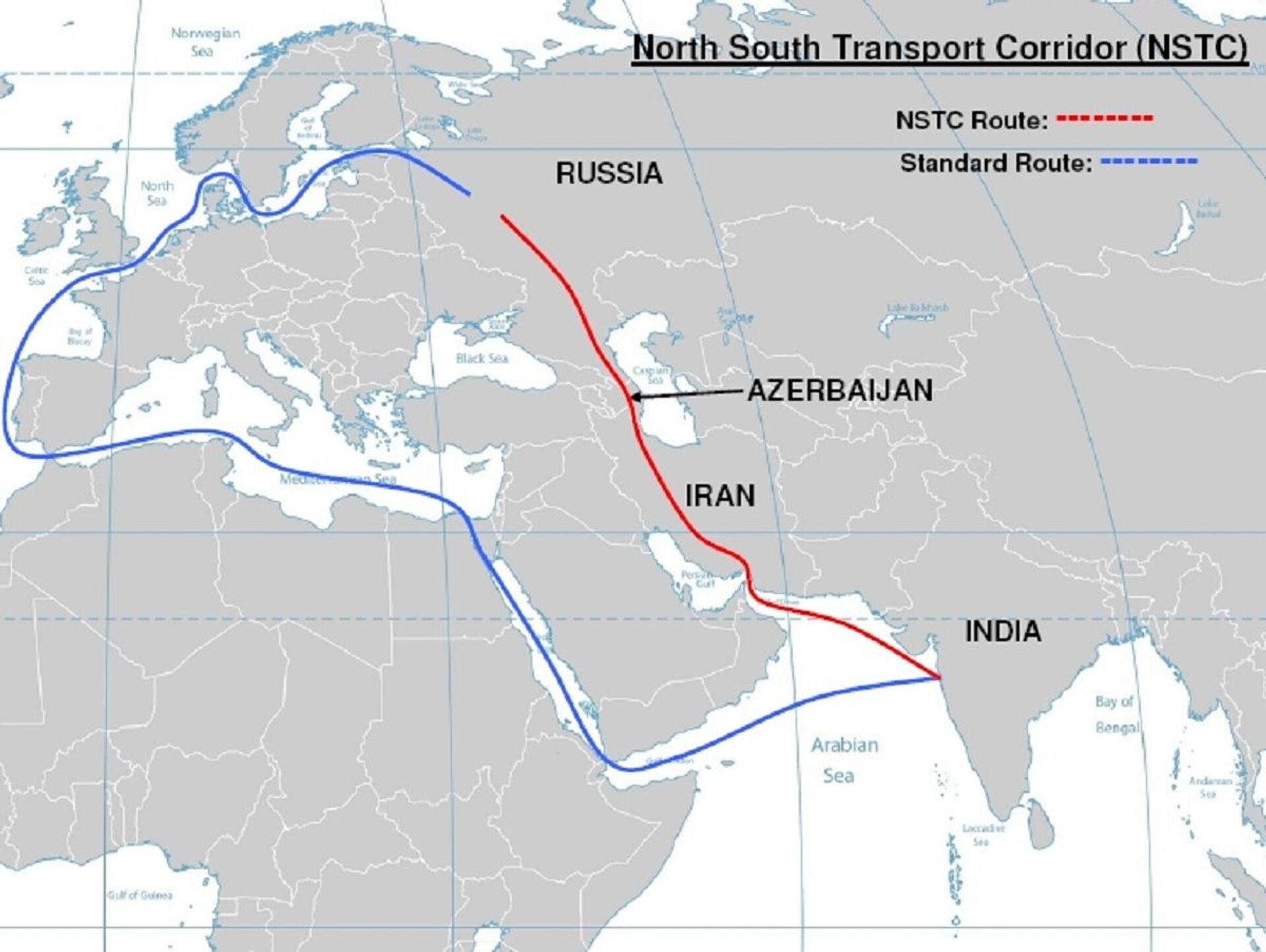https://sputnikglobe.com/20230614/washington-trying-to-blackmail-armenians-in-karabakh-into-us-brokered-talks-heres-why-1111147719.html
Washington Trying to Blackmail Armenians in Karabakh Into US-Brokered Talks: Here’s Why
Washington Trying to Blackmail Armenians in Karabakh Into US-Brokered Talks: Here’s Why
Sputnik International
The dispute between Armenians and Azerbaijanis over the landlocked mountainous region of Nagorno-Karabakh has been a source of severe tensions between the Caucasus nations, with several wars fought over the territory over the past 35 years. Moscow has worked tirelessly to mediate the crisis.
2023-06-14T13:51+0000
2023-06-14T13:51+0000
2023-06-14T14:12+0000
asia
ilham aliyev
nikol pashinyan
vladimir putin
nagorno-karabakh
azerbaijan
armenia
european union (eu)
russian foreign ministry
european council
https://cdn1.img.sputnikglobe.com/img/103841/17/1038411701_0:243:7360:4383_1920x0_80_0_0_b0836724e7dfa66e61f8b82b31c88a93.jpg
Washington is reportedly making a concerted, behind-the-scenes push to interfere directly in negotiations between Azerbaijan and the ethnic Armenian-led unrecognized Republic of Nagorno-Karabakh, including by blackmailing the Armenian side with the threat of a fresh round of violence in the region.Informed sources cited by Russian media indicated that US officials - which until recently had limited their "mediation" efforts to talks between Azerbaijan and Armenia proper, are now trying to force their way into the sensitive negotiations between Baku and Stepanakert (Nagorno-Karabakh’s self-proclaimed capital).The “ultimatum” has reportedly been received negatively in Stepanakert overall, but got support from Sergey Ghazaryan, the self-proclaimed republic’s foreign minister.The past few weeks have seen a flurry of US and EU diplomatic activity in the Southern Caucasus, with Armenia and Azerbaijan’s foreign ministers meeting in Washington with Secretary of State Antony Blinken in early May, and Armenian Prime Minister Nikol Pashinyan and Azerbaijani President Ilham Aliyev holding talks in Brussels mediated by European Council chief Charles Michel the same month. In late May, Pashinyan, Aliyev, and Russian President Vladimir Putin held trilateral talks in Moscow. Pashinyan and Aliyev got into an argument much reported on in Western media about transport corridors during the Eurasian Economic Union Summit, with Putin intervening to quell the dispute.US and EU mediators spoke of “significant progress” in the Armenian-Azeri talks, but few details were made public. However, on May 22, Pashinyan made the bombshell announcement that Yerevan would be ready to recognize Nagorno-Karabakh as part of Azerbaijan if the security of its ethnic Armenian population was guaranteed. This move was sharply criticized by some observers as a de-facto concession by Yerevan to leave the Karabakh issue “practically to the mercy of Western sponsors,” with autonomy guarantees for the region left off the table.Moscow deployed a 2,000 troop-strong peacekeeping contingent to Nagorno-Karabakh three years ago after the September-November 2020 war, with these forces patrolling the Lachin corridor connecting Armenia proper to Nagorno-Karabakh. Russia’s strategy has revolved around seeking to maintain the status quo, ensuring the safety and security of the local civilian population, and preventing any further hostilities from breaking out.Concerted Push to Eject Russia From RegionRetired Russian Foreign Ministry senior advisor Alexander Ananiev fears US and its allies and sympathetic actors in Yerevan and Baku have decided to try to remove Russia from its mediation role, and to eliminate Russia’s presence in the Southern Caucasus generally (including through the removal of the Russian military base in Armenia proper, and Yerevan’s withdrawal from Russian-led integration processes and defense agreements).'Perfect' TimingStanislav Tarasov, a veteran Russian political scientist specializing in Caucasus affairs, points out that the timing of the reported US "mediation effort" in Nagorno-Karabakh lines up perfectly with the signing of a major railway construction agreement by Russian and Iranian officials last month to bring the ambitious North South Transport Corridor one step closer to reality.“The West offers nothing, have no solution of their own. They play on contradictions between Yerevan and Baku which Moscow is trying to neutralize or eliminate,” Tarasov told Sputnik. For Russia, the opening of new trade and transit routes is particularly vital today, Tarasov said, owing to the breakdown in economic relations with the West after the escalation of the Ukraine crisis, which deprived Moscow of key routes for global trade.
https://sputnikglobe.com/20230605/armenia-azerbaijan-deny-agreeing-return-to-1975-borders-1110918486.html
https://sputnikglobe.com/20230523/pashinyan-yerevan-willing-to-concede-nagorno-karabakh-if-armenian-population-respected-1110528416.html
nagorno-karabakh
azerbaijan
armenia
Sputnik International
feedback@sputniknews.com
+74956456601
MIA „Rossiya Segodnya“
2023
News
en_EN
Sputnik International
feedback@sputniknews.com
+74956456601
MIA „Rossiya Segodnya“
Sputnik International
feedback@sputniknews.com
+74956456601
MIA „Rossiya Segodnya“
united states, nagorno-karabakh, russia, armenia, azerbaijan, negotiations, peace talks, pressure, talks
united states, nagorno-karabakh, russia, armenia, azerbaijan, negotiations, peace talks, pressure, talks
Washington Trying to Blackmail Armenians in Karabakh Into US-Brokered Talks: Here’s Why
13:51 GMT 14.06.2023 (Updated: 14:12 GMT 14.06.2023) The dispute between Armenians and Azerbaijanis over the landlocked mountainous region of Nagorno-Karabakh has been a source of severe tensions between the Caucasus nations, with several conflicts fought over the territory over the past 35 years. Moscow has worked tirelessly to mediate the crisis.
Washington is reportedly making a concerted, behind-the-scenes push to interfere directly in negotiations between Azerbaijan and the ethnic Armenian-led unrecognized Republic of Nagorno-Karabakh, including by blackmailing the Armenian side with the threat of a fresh round of violence in the region.
Informed sources cited by Russian media indicated that US officials - which until recently had limited their "mediation" efforts to talks between Azerbaijan and Armenia proper, are now trying to force their way into the sensitive negotiations between Baku and Stepanakert (Nagorno-Karabakh’s self-proclaimed capital).
“In the form of an ultimatum, Washington is forcing Nagorno-Karabakh representatives to agree to a meeting with the Azeri side in the near future in a third country under the supervision of American curators. Moreover, the Karabakh leadership has been told that if they refuse, they will be threatened with something close to an Azerbaijani ‘counter-terrorist operation’ in the region,’” the sources indicated.
The “ultimatum” has reportedly been received negatively in Stepanakert overall, but got support from Sergey Ghazaryan, the self-proclaimed republic’s foreign minister.
The past few weeks have seen a flurry of US and EU diplomatic activity in the Southern Caucasus, with Armenia and Azerbaijan’s foreign ministers
meeting in Washington with Secretary of State Antony Blinken in early May, and Armenian Prime Minister Nikol Pashinyan and Azerbaijani President Ilham Aliyev
holding talks in Brussels mediated by European Council chief Charles Michel the same month. In late May, Pashinyan, Aliyev, and Russian President Vladimir Putin held trilateral talks in Moscow. Pashinyan and Aliyev got into an argument
much reported on in Western media about transport corridors during the Eurasian Economic Union Summit, with Putin intervening to quell the dispute.
US and EU mediators spoke of “significant progress” in the Armenian-Azeri talks, but few details were made public. However, on May 22, Pashinyan made the bombshell announcement that Yerevan would be
ready to recognize Nagorno-Karabakh as part of Azerbaijan if the security of its ethnic Armenian population was guaranteed. This move was sharply
criticized by some observers as a de-facto concession by Yerevan to leave the Karabakh issue “practically to the mercy of Western sponsors,” with autonomy guarantees for the region left off the table.
Moscow deployed a 2,000 troop-strong
peacekeeping contingent to Nagorno-Karabakh three years ago after the September-November 2020 war, with these forces patrolling the Lachin corridor connecting Armenia proper to Nagorno-Karabakh. Russia’s strategy has revolved around seeking to maintain the status quo, ensuring the safety and security of the local civilian population, and preventing any further hostilities from breaking out.
Concerted Push to Eject Russia From Region
Retired Russian Foreign Ministry senior advisor Alexander Ananiev fears US and its allies and sympathetic actors in Yerevan and Baku have decided to try to remove Russia from its mediation role, and to eliminate Russia’s presence in the Southern Caucasus generally (including through the removal of the Russian military base in Armenia proper, and Yerevan’s withdrawal from Russian-led integration processes and defense agreements).
“Yerevan, with a geopolitical turn away from Russia, wants to receive the support of the West, but, in accordance with the ‘post-Soviet traditions’, not to lose anything from Russia in economics terms. For Baku, it’s important to distance itself from Moscow due to sanctions and the desire to gain a foothold as an important energy supplier to the European Union,” Ananiev
wrote in a recent article in a major Russian international affairs journal.
Stanislav Tarasov, a veteran Russian political scientist specializing in Caucasus affairs, points out that the timing of the reported US "mediation effort" in Nagorno-Karabakh lines up perfectly with the signing of a major railway construction agreement by Russian and Iranian officials
last month to bring the ambitious North South Transport Corridor one step closer to reality.
“The West offers nothing, have no solution of their own. They play on contradictions between Yerevan and Baku which Moscow is trying to neutralize or eliminate,” Tarasov told Sputnik.
“America’s interests are very simple. First, they would potentially like to use the South Caucasus as a springboard for ‘containing Iran.’ So far, this has not been achieved, although they did manage to carry out an operation to complicate ties between Azerbaijan and Iran. Second, they have managed to preserve a hotbed of regional tension via the Karabakh conflict. Third, the implementation of the North-South Corridor’s transit routes requires huge investments –investments which do not flow to an area facing the potential threat of war. This means Russia will seek to resolve this situation…while the West will try to destabilize it, so that Russia can’t break through the Southern Caucasus and unblock its communications,” the observer explained.
For Russia, the opening of new trade and transit routes is particularly vital today, Tarasov said, owing to the breakdown in economic relations with the West after the escalation of the Ukraine crisis, which deprived Moscow of key routes for global trade.
Consequently, "in order to block Russia in this region, the West began to put spokes in the wheels, including relating to the peace processes formed which emerged after the Second Karabakh War, but which, unfortunately, could not be fully resolved at the time," he said.





